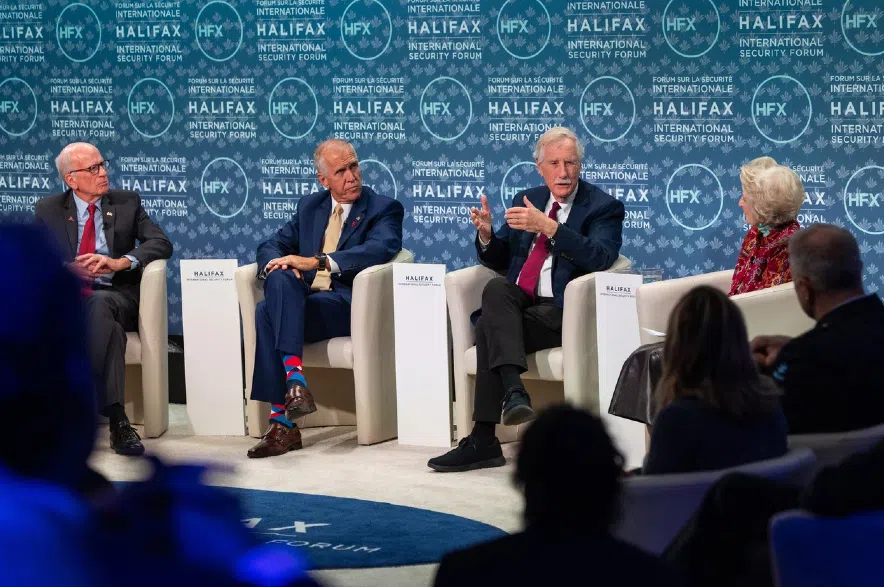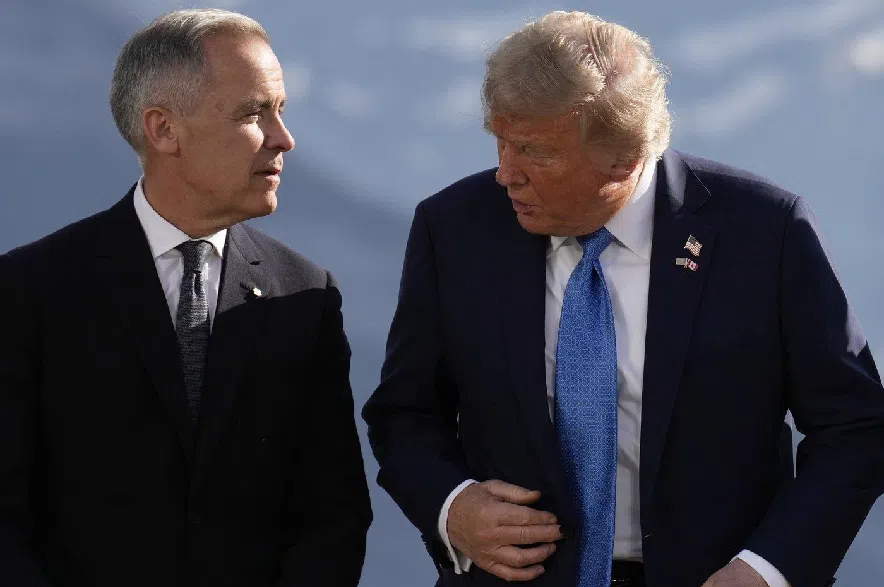JOHANNESBURG — Prime Minister Mark Carney says he’s not in a hurry to resume trade talks with U.S. President Donald Trump but will “speak to him again when it matters.”
Carney says he “doesn’t have a burning issue to speak with the president about right now” and will speak again with the president “when it’s appropriate.”
Read more:
- At G20, Canada joins Europe and Japan in rejecting Trump’s Ukraine plan
- G7 security ministers in Ottawa to talk drugs, organized crime, migrant smuggling
- Tariffs & Saskatchewan: What do tariffs mean for you?
The prime minister made the remarks speaking with reporters at a news conference in Johannesburg, South Africa, where he is attending a G20 Summit.
Trump had scuttled talks last month over his punishing tariffs on steel, aluminum and autos when the Ontario provincial government ran an anti-tariff ad campaign.
Carney says Trump is busy but he looks forward to speaking to the president soon, likely sometime in the next two weeks, and will be ready for when America wishes to return to the table on trade.
Canada is meantime preparing separately to enter talks to renew the Canada-United States–Mexico Agreement (CUSMA), the country’s most important free trade pact.

From left: Senator Peter Welch, of Vermont, Senator Thom Tillis, of North Carolina, Senator Angus King, of Maine and moderator Congresswoman Jane Harman take part in the Halifax International Security Forum, Saturday, November 22, 2025. (THE CANADIAN PRESS/Kelly Clark)
Canadians ‘don’t think of Americans as friends’
The tariffs imposed on Canada by Trump have clearly caused economic pain for Canada, but a U.S. senator from Maine says he’s more worried about how Canadians are reacting on a personal level.
“Like any neighbours, there’s always going to be issues back and forth, and we’ve been fighting about softwood lumber for as long as I could remember,” Angus King told an international security conference in Halifax on Saturday.
“But the deeper problem is the cultural break; the idea that Canadians don’t think of Americans as their friends and neighbours, but as adversaries.”
The annual Halifax International Security Forum, which opened on Friday, has attracted more than 300 delegates from around the world, including politicians, academics, government officials, military leaders and non-government organizations.
The focus of this year’s conference is democracy, but questions about Canada-U.S. relations touched off a heated debate on Saturday morning when King and three other American politicians were asked to talk about their country’s place in the world.
King, one of only two independents in the U.S. Senate, said the lingering rift between Canadians and Americans is particularly troubling in a state that borders on New Brunswick and Quebec.
“Being from a state where we have people going across the border to get a haircut … it’s a sad day. And if there was some point to it, that would be one thing. But there was no benefit to the United States imposing these ridiculous tariffs.”
In response, Republican Sen. Thom Tillis reminded the audience that Canada and the U.S. are part of a broader family of democratic countries that have a long history of squabbles over trade.
“I know that if we were under threat, we would come to each others’ aid,” said the outspoken senator from North Carolina.
But Tillis quickly pivoted to a harsh critique of what he said was Canada’s failure to meet its financial obligations to NATO, saying Ottawa still owes the military alliance more than $300 billion.
“Every prime minister has said the same thing, ‘We’re going to get to it,’ and they never got to it,” said Tillis.
“Some look down their noses at the United States because of health care. On the other hand, we’ve met our obligations to funding our mutual defence for as long as NATO has been around.”
Former California congresswoman Jane Harman, a Democrat, argued that Canada recently committed to spending more on defence. In June, Prime Minister Mark Carney announced a plan to boost spending by $9 billion by March of next year, bringing defence spending to two per cent of Canada’s GDP.
Tillis scoffed at the promise. “That’s lovely, but could we do a makeup for the 20 years of shortfall payments as well?”
Republican Sen. Kevin Cramer, who represents North Dakota, said King was right to call attention to the “cultural break” between the two countries.
“There’s become a tension,” he said later during a news conference, adding that the strain has led to fewer Canadians travelling to the United States for pleasure.
“In North Dakota, that happens to be shopping in the malls and staying in the hotels …. Those numbers are down because people are angry.”
Still, Kramer said he was hopeful something could be worked out despite Trump’s recent decision to impose more tariffs on Canadian businesses.
“Our relationship with Canadians is very personal,” he said. “The best way to fix this is to get back to the negotiating table and fix whatever it is that separates us on trade …. People in both countries are anxious to reunite.”
Read more:











